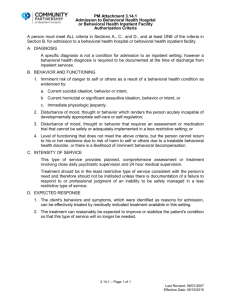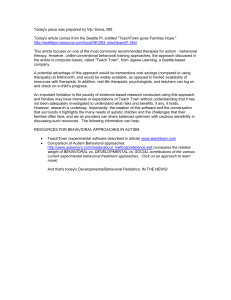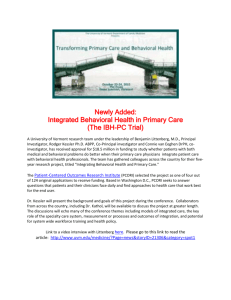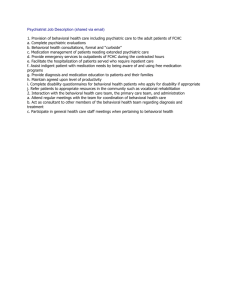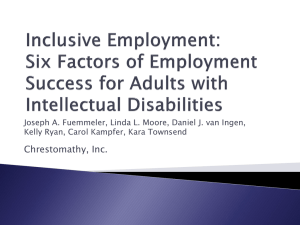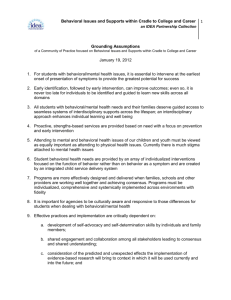2.10 – Crisis Intervention Services
advertisement
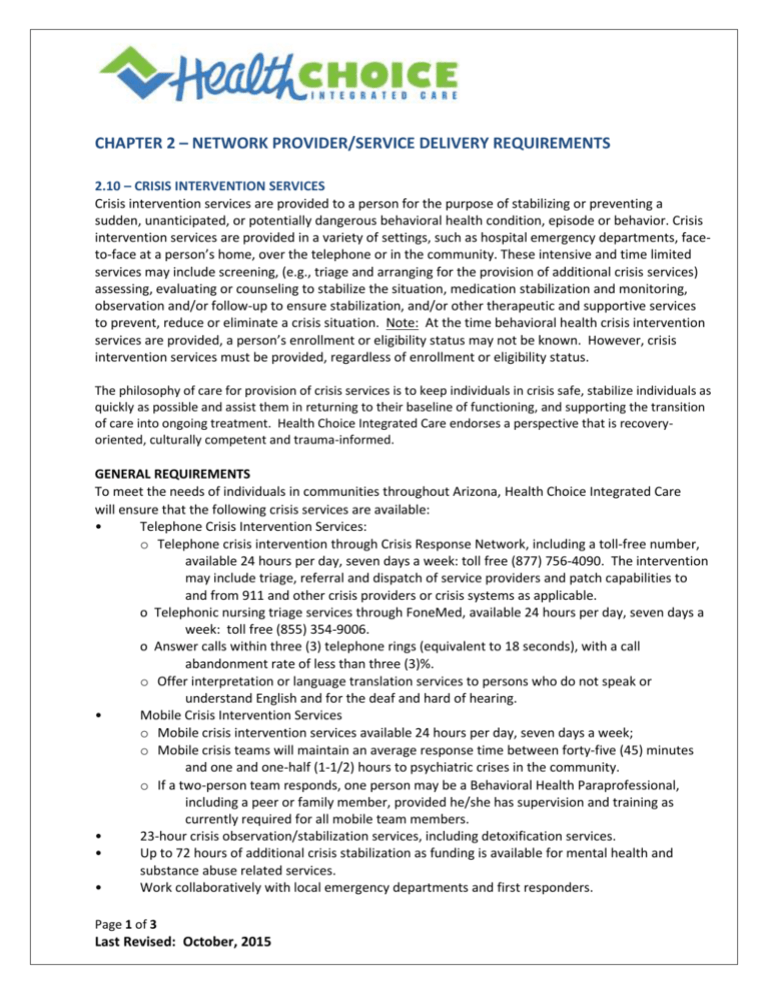
CHAPTER 2 – NETWORK PROVIDER/SERVICE DELIVERY REQUIREMENTS 2.10 – CRISIS INTERVENTION SERVICES Crisis intervention services are provided to a person for the purpose of stabilizing or preventing a sudden, unanticipated, or potentially dangerous behavioral health condition, episode or behavior. Crisis intervention services are provided in a variety of settings, such as hospital emergency departments, faceto-face at a person’s home, over the telephone or in the community. These intensive and time limited services may include screening, (e.g., triage and arranging for the provision of additional crisis services) assessing, evaluating or counseling to stabilize the situation, medication stabilization and monitoring, observation and/or follow-up to ensure stabilization, and/or other therapeutic and supportive services to prevent, reduce or eliminate a crisis situation. Note: At the time behavioral health crisis intervention services are provided, a person’s enrollment or eligibility status may not be known. However, crisis intervention services must be provided, regardless of enrollment or eligibility status. The philosophy of care for provision of crisis services is to keep individuals in crisis safe, stabilize individuals as quickly as possible and assist them in returning to their baseline of functioning, and supporting the transition of care into ongoing treatment. Health Choice Integrated Care endorses a perspective that is recoveryoriented, culturally competent and trauma-informed. GENERAL REQUIREMENTS To meet the needs of individuals in communities throughout Arizona, Health Choice Integrated Care will ensure that the following crisis services are available: • Telephone Crisis Intervention Services: o Telephone crisis intervention through Crisis Response Network, including a toll-free number, available 24 hours per day, seven days a week: toll free (877) 756-4090. The intervention may include triage, referral and dispatch of service providers and patch capabilities to and from 911 and other crisis providers or crisis systems as applicable. o Telephonic nursing triage services through FoneMed, available 24 hours per day, seven days a week: toll free (855) 354-9006. o Answer calls within three (3) telephone rings (equivalent to 18 seconds), with a call abandonment rate of less than three (3)%. o Offer interpretation or language translation services to persons who do not speak or understand English and for the deaf and hard of hearing. • Mobile Crisis Intervention Services o Mobile crisis intervention services available 24 hours per day, seven days a week; o Mobile crisis teams will maintain an average response time between forty-five (45) minutes and one and one-half (1-1/2) hours to psychiatric crises in the community. o If a two-person team responds, one person may be a Behavioral Health Paraprofessional, including a peer or family member, provided he/she has supervision and training as currently required for all mobile team members. • 23-hour crisis observation/stabilization services, including detoxification services. • Up to 72 hours of additional crisis stabilization as funding is available for mental health and substance abuse related services. • Work collaboratively with local emergency departments and first responders. Page 1 of 3 Last Revised: October, 2015 Psychiatric and Substance Use Emergencies Individuals requiring an emergency admission are admitted to the closest in-network facility to where the person is located. Each inpatient facility has a defined primary service area; however, individuals may be admitted to any in-network facility if the primary facility is full. In the event that all in-network inpatient facility beds in the region are full, based on member eligibility, individuals may be eligible for admission to other out-of-network inpatient facilities. Health Choice Integrated Care maintains a Crisis Placement Directory detailing the available network for its providers serving children and adolescents in crisis. It is published and distributed to providers on a semi-annual basis or as updates are needed. Please also refer to the below list of crisis resources for each county HCIC serves. BEHAVIORAL HEALTH CRISIS RESOURCES BY COUNTY Regionwide, Health Choice Integrated Care provides telephonic crisis services, including mobile crisis dispatch, via a hotline available 24/7. To obtain crisis resources, please call (877) 756-4090. Telephonic services are provided through Crisis Response Network. Physical Clinic Locations County Providers (for walk-in crisis services M-F 8A-5P) Apache Gila Coconino Mohave Navajo Yavapai Little Colorado Behavioral Health Clinic Springerville, St. Johns Community Bridges, Inc. South East Arizona Behavioral Health Services Southwest Behavioral Health Services Horizon Health and Wellness Child & Family Support Services Encompass Health Services Southwest Behavioral Health Services The Guidance Center Mohave Mental Health Clinic Southwest Behavioral Health Services Globe, Payson Payson Globe ,Payson Flagstaff Fredonia, Littlefield, Page Flagstaff Flagstaff, Williams Bullhead City, Kingman, Lake Havasu Bullhead City, Kingman, Lake Havasu Community Bridges, Inc. Holbrook, Winslow Community Counseling Centers Holbrook, Snowflake/Taylor, Show Low, Winslow Child & Family Support Services Prescott Valley Southwest Behavioral Health Services Prescott Valley West Yavapai Guidance Clinic Chino Valley, Prescott, Prescott Valley Globe To refer for non-crisis behavioral health services, please call HCIC Member Services at (800) 640-2123 Monday through Friday 8AM to 5PM. Last Revised: 10/1/15 Page 2 of 3 Last Revised: October, 2015 MANAGEMENT OF CRISIS SERVICES While Health Choice Integrated Care must provide a standard set of crisis services to ensure the availability of these services throughout the state, Health Choice Integrated Care will also be able to meet the specific needs of communities located within their service area. Health Choice Integrated Care will utilize the following in managing crisis services: • • • • Allocate and manage funding to maintain the availability of required crisis services for the entire fiscal year; Work collaboratively with local hospital-based emergency departments to determine whether a Health Choice Integrated Care-funded crisis provider should be deployed to such locations for crisis intervention services; Work collaboratively with local inpatient hospitals to determine whether and for how many hours such locations are used for crisis observation/stabilization services; and When Non-Title XIX/XXI eligible individuals are receiving crisis services and require medication, Health Choice Integrated Care may provide medications on the HCIC medication formulary (see Chapter 15.0 – ADHS/DBHS Drug List. Whenever possible, Crisis Services are to be delivered within the community at the least restrictive level of care available. Page 3 of 3 Last Revised: October, 2015
